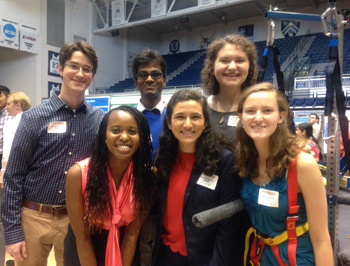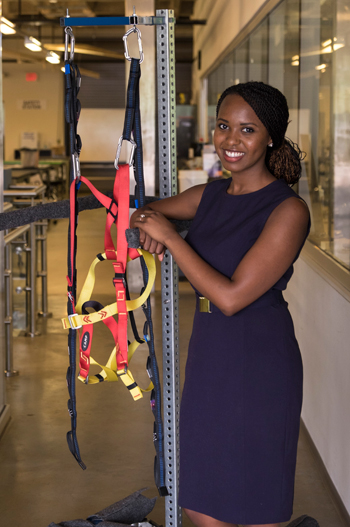When Jennifer Muturi, a 2015 Rice graduate and one of the recipients of this year’s Alan Grob Prize, returned to campus in fall 2014 after a Susan McAshan Summer Service Internship in Buduburam, Ghana, she had her sights set on a solution. Having worked at a rehabilitation center at a former camp for Liberian refugees, she saw the need for adequate physical therapy equipment to better serve the center’s pediatric patients and alleviate their various disabilities.

Jennifer Muturi (second from left) was assisted by students in Rice’s Introduction in Engineering Design course in building a physical therapy apparatus. From left: George Barrow, Muturi, Akhil Surapaneni, Brianna Singh, Catherine Dunaway and Taylor Jacobe.
Muturi called on students in Ann Saterbak’s Introduction to Engineering Design course to help her design and build a physical therapy apparatus. This summer she will take the apparatus to Ghana and instruct center staff on its use and maintenance.
“I was astounded by how vast the differences were between health care in the Texas Medical Center and the Buduburam refugee camp,” Muturi said of her initial experiences in Ghana. “My kids, the children at the Point Hope day care with a range of mental and physical disabilities, were strapped onto wooden furniture in an effort to strengthen their legs. To practice walking, their only resources were the caretakers and missionaries who held them up as they bounced around on their legs. It was radically different from the resources I knew were available in America. I started thinking about all the friends (at Rice) I’d known who were enrolled in a freshman or senior design course and how their machines benefited the Houston community. I thought, ‘Why not give them a chance to make a global impact? Why couldn’t my kids benefit from these design courses as well?’”
The finished apparatus is an inexpensive, shippable and easily adjustable device made of steel, dubbed “Rolling Frame with Harness,” that enables children to practice the motion of walking and develop strength in their legs. Tested and verified by physical therapists at Shriners Hospital for Children–Houston, it holds patients who weigh up to 150 pounds and are up to 5 feet 5 inches in height; it can function for up to 10 years.
Saterbak, professor in the practice of bioengineering education, commended Muturi’s entrepreneurial approach in bringing the project to fruition. “Jennifer is one of a small handful of students who have come to me with a project idea over the five years that I have taught Introduction to Engineering Design,” Saterbak said.

Muturi stands next to the finished physical therapy apparatus, dubbed “Rolling Frame with Harness,” at Rice’s Oshman Engineering Design Kitchen. Photo by Jeff Fitlow
Muturi, who majored in sociology and policy studies with a minor in poverty, justice and human capabilities (PJHC), was recommended for the Alan Grob Prize by Anne Dayton, her PJHC adviser and a senior staff editor at the Rice-based Journal of Feminist Economics.
“During her time at Rice, Jennifer has served disadvantaged communities in Houston and abroad, with a particular focus on the needs of refugee and immigrant communities,” Dayton wrote in her nomination letter. “Jennifer has displayed remarkable dedication and persistence in her efforts. A skilled organizer, Jennifer excels at bringing people together to advance causes she is passionate about.”
“The (Point Hope) day care has the benefits of a caring physical therapy team, volunteers and community members who are willing and able to contribute their time to helping children with disabilities,” Muturi said. “They have fought to keep the center from being shut down. I saw so many good things happening at the former refugee camp and just wanted to give them some resources to do even better.”
Muturi said her post-Rice plans include eventually earning a master’s in public health and public policy administration degree through the Gates Millennium Scholars program.


Leave a Reply